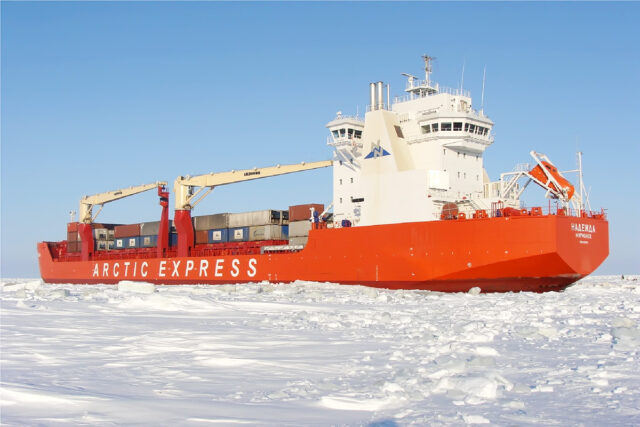
China and Russia Expand Cooperation on Arctic Transit Infrastructure
Publication: Eurasia Daily Monitor Volume: 21 Issue: 127
By:

Executive Summary:
- The Arctic Express route was launched in July as part of the joint Russian-Chinese development of the “Ice Silk Road,” which aims to develop the shortest route from the Pacific Ocean to the Atlantic via the Arctic.
- China increasingly sees strategic benefit in deepening its involvement in the development and security of Russia’s Northern Sea Route (NSR), believing that it will complement Beijing’s Belt and Road Initiative.
- Russia’s Rosatom plans to extend the NSR, increasing its vulnerability to NATO coastal states. Boosting infrastructure along the route remains a challenge in handling growing trade traffic amid Western sanctions and serious problems in the Russian shipbuilding industry.
On July 5, the first “Arctic Express No. 1” freight train departed from Moscow to Arkhangelsk, where its cargo was offloaded onto a vessel bound for Shanghai. According to the Russian Export Center, “The new route will make it possible to decrease the period of cargo delivery from Moscow to Chinese ports by 35–55 percent” and will allow for the delivery of more than 20,000 tons of 20-foot equivalent units (TEU) annually (RIA Novosti, July 5). The launch of the Arctic Express was supported by the Chinese Embassy in Russia, Union of Chinese Entrepreneurs in Russia, and the regional governments in Moscow and Arkhangelsk. The new Arctic rail-ship transit route is the latest in bilateral efforts between the Kremlin and Beijing to expand their cooperation in trade and transit, with a particular focus on the Arctic (see EDM, September 4). According to Russia’s Federal Customs Service, in 2022, Russian-Chinese trade reached $190 billion, a record spurred by the introduction of Western sanctions against the Kremlin in the wake of its full-scale invasion of Ukraine. In 2023 the trade turnover between Russia and China surged by 26.3 percent to $240.11 billion (RBC, January 12). The development of the Arctic Express project points toward further cooperation between China and Russia in the field of transportation, especially during a time where Russia is doing everything it can to dodge Western sanctions. As Moscow focuses more energy on the Arctic, Western powers, especially countries bordering the Arctic, will have to consider how to best defend and maintain control in the region.
The Arctic Express project is being implemented as part of joint Russian-Chinese development of the “Ice Silk Road,” an initiative aimed at creating the shortest route from the Pacific Ocean to the Atlantic via the Arctic. Due to the reorientation of cargo flow to Arctic lines, the volumes carried by the Baikal-Amur Mainline and Trans-Siberian Railway (collectively referred to as the “Eastern Polygon”) in the direction of China will decrease, while exporters in the central and northwestern regions of Russia will be able to carry direct deliveries of products to China without dependence on transit through third countries. Specifically, up to 12 Arctic Express shipments are already projected to be sent by the end of 2024 (Trans.ru, July 8). Beyond the Arctic Express, China increasingly sees strategic benefit in deepening its involvement in the development of Russia’s Northern Sea Route (NSR), believing that it will complement its Belt and Road Initiative and the 21st Century Maritime Silk Road.
Russian logistics companies are also seeking to bolster China’s westward rail traffic to Russia. For example, operator Delovye Linii has opened a new route for delivering goods from China to St. Petersburg. Goods are transported from China to the port of the city on the Neva via the Arctic Ocean, bypassing transport delays on the Trans-Siberian Railway. As a result, the delivery time for goods has been reduced by ten to 25 days. According to statistics, imports from China prevail in the Eastern Polygon—more than 70 percent of all shipments for the first half of 2024. More than 60 percent of all deliveries are delivered to the European part of Russia. These are often spare parts and industrial and electrical equipment (Telekanal Cant-Peterburg, August 6).
Russia’s nuclear energy monopoly Rosatom, operator of the NSR, has announced ambitious plans for the route’s expansion. On August 9, Vladimir Panov, Rosatom’s special representative for Arctic development and deputy chairman of the State Commission for Arctic Development, announced the preparation of a new project for NSR development, with the passage being extended from St. Petersburg and Kaliningrad in the Baltic to Vladivostok and adding a total of around 8,000 nautical miles to the approximately 3,000-nautical-mile Novaia Zemlya-Bering Strait passage (Vedomosti, August 9). If the plan is implemented, however, it would increase the NSR’s maritime vulnerabilities beyond Russia’s current Arctic routes. Vessels departing St. Petersburg and Kaliningrad would sail near the coastal waters of North Atlantic Treaty Organization (NATO) members Estonia, Latvia, Lithuania, Finland, Sweden, Poland, Germany, and Denmark before reaching the North Sea. Their northward passage would then traverse near the United Kingdom and Norway before moving around Norway’s North Cape to safety in the waters of Russia’s Kara Sea.
China’s Arctic Express is the latest iteration of its attempts to secure maritime commerce, as Russia’s NSR solely traverses Russian territorial waters (see EDM, April 4, September 28, 2023). The NSR represents a valuable supplement to Beijing’s maritime routes as tensions increase in the South China Sea and around Taiwan. The South China Sea has been China’s traditional maritime export route, where it claims sovereignty over its “inherent territory,” a position inconsistent with the UN Convention on the Law of the Sea. For Russia, the benefit is that the NSR has been largely immune from increasingly stringent Western sanctions over Ukraine. The only bilateral commerce question to be resolved is whether Russia can upgrade its Eastern Polygon and NSR infrastructure to handle the increased traffic that will inevitably follow. As for extending the NSR into the Baltic Rosatom’s leadership, it may benefit Moscow officials to read about the fate of Arctic convoys bound for the Soviet Union and share those insights with their Chinese colleagues.



